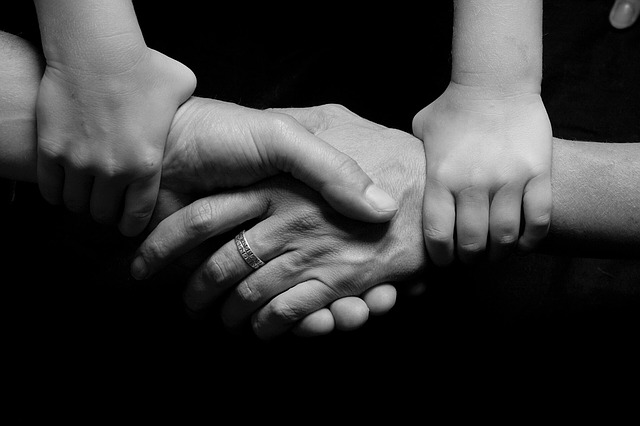When it comes to divorce and children, it’s worth clarifying that divorce does not usually completely separate a couple from each other, especially if they have children.
In many cases, divorced couples will still need to see each other regularly, learn to co-parent, and makes decisions together about their common children.
So how does one share the painful and challenging process of divorce with children?
When and what to tell the kids
It’s hard to know how your children will take the news. Their responses can vary dramatically based on age, ability, emotional intelligence, and attachment to their parents.
Some children will be able to talk through their thoughts and feelings while others will find different ways to cope.
One American convert to Islam, who was 11 when her parents divorced, recalls getting through her parent’s divorce via her activities and friendships.
“I was in a youth group that was really strong,” she shares, “and I had one friend whose house I basically lived at and could stay over constantly. It was a positive place in my life to have fun and forget about my sad and empty feeling home.”
In cultures where a woman moves back into a family home after divorce, other family’s lives, and children, may be affected as well. One sister shared, “I came back to my parent’s house where my brother already lived with his wife and two kids. [Being here] affects their lifestyle.”
For another sister who moved back home after divorce, her relationship with other family members was tense. “I felt like I was treated like a child and I didn’t have my own space. I felt my kids and I were shuffled around when others came over.”
However, even though younger kids may not understand their new living situations, it’s possible that older children may be more understanding and tolerant than expected about any hardships caused by the divorce.
One sister shares that there was some tension and confusion between her and her children when she got her restraining order against her ex-husband. Thankfully, however, her children don’t demonstrate anger or resentment towards her about it now.
“My oldest children were more aware of the abuse so they understood my side of things,” she explains. “My two oldest also had a very bad relationship with their father and are much more at ease and happy since the divorce. They both said they were waiting for me to divorce him.”
Parental alienation or disappearance
Parental alienation from a parent that wants to be active and involved in a child’s life is also challenging. After divorce, some parents can lose all direct contact with their children.
Younger children may not understand the reasons for the divorce and miss their absent or non-custodial parent terribly.
Some kids have a difficult time because they feel rejected by their own parent. Other children may get depressed wondering where their absent parent is, or wonder why he/she doesn’t want to see them anymore.
Abuse and children
Getting out of abusive marriages can be a relief for both adult and child victims.
One sister shares that ending her marriage was a huge blessing for her children. “The abuse they endured affected them psychologically,” she shares, “particularly my eldest as my youngest can’t remember much. It’s taken a long time, and she still hasn’t fully healed mentally.”
Extra stressors on children
Divorce can make things difficult for everyone, parents and children included. If children are young, parents may try to shield them from the financial hardships and other troubles.
One sister’s husband took everything. “I lost my rental property due to not being able to pay the rent. I also had to sell my car and had a period of time surviving on food vouchers and food parcels,” she recalls. “It was a particularly difficult time. I didn’t want my children to know the extent of how difficult things were and attempted to keep everything as normal as possible.”
If the children are older, they may be asked to help out. Some may either start working or contribute a portion of their earnings towards household expenses.
One sister’s financial assistance was in jeopardy for several months. In the meantime, to make ends meet, she “accepted help from friends and the community with groceries, and my son and daughter’s income from their jobs.”
But this is not to say that women and children are the only ones who suffer financially. Though most men are already the primary earners, a divorce can stretch their budgets even more. Some men struggle as well.
One brother shared that it was difficult to both pay for his own expenses after his divorce and also maintain his adulterous ex-wife’s living situation as well.
“There was no iddah,” he recalled. “I was kicked out of our home by her for no apparent reason. [The divorce] hurt me mentally, emotionally, and financially. I was still paying the bills for my ex and our kids to stay at our place while I was homeless for almost two years.”

Co-parenting after divorce
Co-parenting becomes the new norm in cases of divorce. After a separation there are living arrangements to sort out and to plan children’s visiting schedules.
One child of divorced parents recalls that it took her mother about seven years to bounce back from her parents’ divorce. She presumes this was because her mother was the one who wanted the divorce. Her mother was happier even though she was struggling financially and logistically.
The sister also estimates that it took her father a bit longer – around 10 years – to get over the divorce and mused that it was, “probably because he was bitter about it.”
While co-parenting is to be encouraged in cases of amicable divorce, in much greater proportion are the marriages that end due to harm, abuse, or neglect. In these cases, it’s best for the custodial parent to go no-contact with the abusive parent as much as possible.
Make sure that all communication and court ordered exchanges of the children go through email, the courts, and/or third parties.
Maintaining connections after divorce
It’s normal for family and friend relations to shift and change as a couple divorces.
As a result of her parent’s divorce, one sister shared that she ended up being closer to her mother than her father. “I did not have a close relationship with my dad because I stayed at his house less and he didn’t seem to know how to deal with teenage girls on his own.” However, she added, “It made me very close with my siblings since we went through it together.”
Another sister shared that all of their mutual friends stayed loyal to her when they divorced. “After my divorce all of his friends become my friends. The divorce affected him.”
In many cases, individuals shared that they spent a good amount of time alone after their divorces. This was as a result of many converging reasons including; not being allowed to have friends (in the case of abusive and controlling marriages), lack of time to maintain relationships as they started work, school, and/or managed as a single parent, relocation after divorce, and even community ostracization.
One woman shares, “I didn’t have any friends to be honest. My ex didn’t allow it, didn’t let me talk to anyone and I had lost all contact with past friends. So after divorce, I slowly found the ability to start talking to people and making friends with other mums at school, and so on.”

Rebuilding healthier relationships as a family
Healing from divorce is generally no different from healing from any other unhealthy relationship or trauma. Counseling can help address individual issues that are holding divorcees back from becoming their most whole and complete self.
As Life Strategist and Leadership Coach, Henrietta Szovati adds that there are two common types of challenges that individuals face in their marriage and life in general. The first is a difficult childhood (which can include damage from emotional, physical, or sexual abuse). The second is inadequate parenting which didn’t empower the individuals to learn healthy husband and wife roles.
It’s important to seek counseling, therapy, and self-introspection to heal these old wounds in addition to the trauma from a divorce.
Taken in this way, divorce can be seen as a learning experience for both parents and children.
One sister recalls that her parents’ divorce taught her, “What you should and should not tolerate in a relationship – for example, not tolerating certain forms of abuse.”
Divorce has the potential to both hurt us and help us change our conditions. It can absolutely be a necessary step to progress as a Muslim.
Not all couples are meant to stay together forever.
Sometimes we need to get in, learn what we are meant to learn, and then get out again. Allah is ultimately the best of planners – bringing people into our lives and removing them for His reasons.
If marriage and divorce can be seen from this perspective – as a challenge and opportunity for growth and learning – both parents and children can make the most of a very difficult situation.
Read More:
http://aboutislam.net/family-society/your-society/maybe-divorce-taking-lightly/